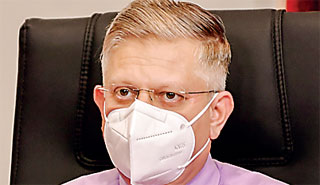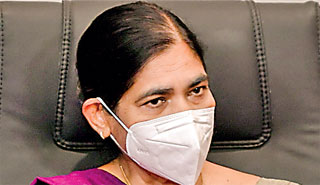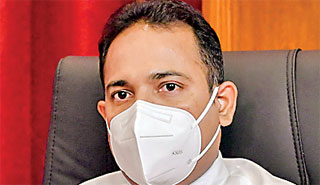Monday Feb 23, 2026
Monday Feb 23, 2026
Saturday, 11 December 2021 00:23 - - {{hitsCtrl.values.hits}}
 |
| Commissioner of Ayurveda Dr. M.D.J. Abeygunawardena |
 |
| State Ministry of Indigenous Medicine Promotion, Rural and Ayurveda Hospitals Development and Community Health Secretary Kumari Weerasekara |
 |
| Ayurveda Hospital, Laggala Medical Officer in Charge Dr. Udara Atapattu
|
The Government is set to boost Ayurvedic and indigenous medicine exports to enhance foreign exchange earnings.
“As there is a high demand for indigenous medicine and Ayurveda, it has been identified as a major foreign exchange earning sector in Sri Lanka, and a number of programs have been launched,” Commissioner of Ayurveda Dr. M.D.J. Abeygunawardena said.
Speaking at a briefing titled ‘Indigenous Medicine to the World’ held at the Presidential Media Centre on Thursday, he said the indigenous medicine and Ayurveda traditional medicine systems had a very high commercial value in the post-COVID-19 era.
“Therefore, this is a valuable opportunity to promote the field through new strategies,” he added.
“Arrangements are being made to provide an integrated service with proper coordination of Western, Indigenous and Ayurvedic medical systems,” he said.
State Ministry of Indigenous Medicine Promotion, Rural and Ayurveda Hospitals Development and Community Health Secretary Kumari Weerasekara also participated at the briefing moderated by President’s Spokesman Kingsly Rathnayaka. Ayurveda Hospital, Laggala Medical Officer-in-Charge Dr. Udara Atapattu was also present.
Weerasekara said the Ayurvedic community’s medical practitioners were playing a vital role in the prevention of non-communicable diseases at school level, and by going from door-to-door, and many programs were in operation to encourage people to have a non-toxic diet.
The briefing said it was regrettable that the potential of indigenous and Ayurvedic medicine had not been taken into account in compiling the maternal mortality ratio indices of Sri Lanka and it was emphasised that the indigenous and Ayurvedic medical sector in the country had received praise internationally as well.
As a large number of local medicines are being released to the market today, the need for greater monitoring of medicinal drug regulations was also highlighted during the briefing.
Responding to questions from the media as to whether the plans have been made to legalise cannabis cultivation and the criteria for releasing them to market, the Commissioner of Ayurveda said that the use of cannabis as a basic ingredient in the indigenous medicine was permitted by the ‘Indigenous Medicine Act of 1961’.
He said that at present there was no shortage of cannabis quantities required for medicines and that cannabis was being issued only as a paste by Ayurvedic doctors.
It was stated that a program had been initiated to regulate all the centres that were being operated as Ayurvedic massage centres and steps had been taken to enforce the law against all illegal centres operating under the name of Ayurveda.
It was revealed that steps would be taken to award the National Vocational Qualification (NVQ) Certificate to the trained Ayurvedic practitioners targeting employment in the tourism industry and plans were afoot to set up herbal gardens and health centres in tourist zones in the future.